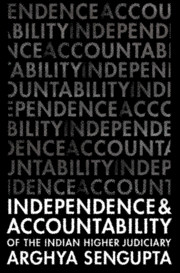Book contents
- Frontmatter
- Dedication
- Contents
- Acknowledgements
- List of Abbreviations
- List of Cases
- List of Statutes
- 1 Introduction
- PART I THE INDIAN EXPERIENCE
- PART II A CONCEPTUAL ANALYSIS
- PART III TYING THE STRANDS
- Epilogue: The Moment the Judiciary Came Out
- Appendix Post-Retirement Employment of Judges in Government-Appointed Positions
- Bibliography
- Index
Epilogue: The Moment the Judiciary Came Out
Published online by Cambridge University Press: 26 April 2019
- Frontmatter
- Dedication
- Contents
- Acknowledgements
- List of Abbreviations
- List of Cases
- List of Statutes
- 1 Introduction
- PART I THE INDIAN EXPERIENCE
- PART II A CONCEPTUAL ANALYSIS
- PART III TYING THE STRANDS
- Epilogue: The Moment the Judiciary Came Out
- Appendix Post-Retirement Employment of Judges in Government-Appointed Positions
- Bibliography
- Index
Summary
This book is being written in the aftermath of a press conference by Justices Chelameswar, Gogoi, Lokur and Joseph convened ‘to communicate to the nation to take care of the institution (of the judiciary)’. In the annals of India's judicial history, this was an unprecedented event. Judges, by tradition and training, speak only through their judgments. Communicating with members of the press, let alone calling a press conference in the middle of a working day in the Supreme Court, is anathema. Yet the four seniormost justices of the Supreme Court chose to openly share their grievances about the functioning of the judiciary, the lack of independence and courage shown by the chief justice of India, and thinly veiled suggestions of governmental interference in the judiciary. It is a ‘discharge of a debt to the nation,’ said Justice Gogoi; ‘[we] don't want someone to say 20 years later that the four judges sold their souls and did not take care of this institution so we place it before the people of this country,’ remarked Justice Chelameswar.
What they placed before the people of India was a letter written by them to the chief justice of India alleging a breach of well-established judicial conventions regarding allocation of cases. The letter, while revealing in part, appeared to say much more by implication. It underlined the fact that the chief justice of India was the first among equals, with no superior authority over other judges of the Supreme Court. He functions as the master of the roster to allocate cases because such allocation is necessary in a court that convenes in multiple benches. In this allocation, he is guided by time-tested conventions regarding strength of the bench and its composition. The letter goes on to allege that such conventions were breached in the case of RP Luthra v . Union of India (hereinafter ‘ Luthra ’). In this case, a two-judge bench ordered that there should be no further delay in finalising the memorandum of procedure in public interest and listed the matter for further hearing.
That the case was assigned to a two-judge bench, the letter implies, was wrong, since the order to the government to finalise the memorandum of procedure taking into account public suggestions had earlier been given by the five-judge bench that heard the NJAC Case in a consequential hearing.
- Type
- Chapter
- Information
- Independence and Accountability of the Higher Indian Judiciary , pp. 264 - 270Publisher: Cambridge University PressPrint publication year: 2019



